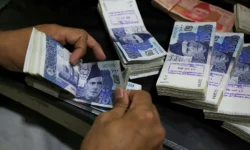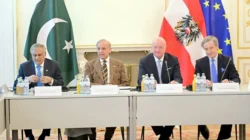PAKISTAN’S MINERAL INDUSTRY-TAPPING INTO ITS MULTI-BILLION DOLLAR POTENTIAL

04 April 2024
Pakistan’s geological potential, competitive policies, advantageous fiscal and regulatory frameworks, and cost-effective labor have attracted investors looking for possibilities in the mineral sector. The country’s natural resources are expected to have a greater impact, increasing their contribution to the national GDP to over 5% from the current level of less than 1%.
Pakistan has abundant mineral resources spread over 600,000 square kilometers. Of the 92 identified minerals, 52 are commercially extracted, with an annual production capacity of 68.52 MMT, as reported by the Trade Development Authority of Pakistan. Balochistan, a mineral-rich province, and the northwestern regions of the country are estimated to hold mineral deposits worth $6 trillion.
The Khewra Salt Mine represents Pakistan’s significant natural resources with a potential yearly income of $12 billion. A deal was inked in Islamabad between Pakistan and an American enterprise, Miracle Saltworks Collective Incorporation, to raise the value of Himalayan Pink Salt for higher export. Pakistan’s pink salt business is expected to get a $200 million investment from a US company, paving the way for the nation to potentially generate billions of dollars from salt exports. Pakistan’s successful SIFC accomplishments are obvious as the country gets ready to sell its pink salt globally, representing a key achievement in its economic progress.
Notwithstanding the persistent propagation of detrimental propaganda aimed at sowing unrest in Pakistan, the country’s plentiful natural mineral deposits serve as a symbol of potential and optimism. Despite the efforts of detractors, Pakistan’s latent capabilities are acknowledged globally, as demonstrated by the eagerness of American corporations to allocate capital towards the country’s mining sectors.
Investments are being considered by American corporations in Balochistan, Pakistan, due to the region’s rich deposits of minerals and mines. Acquiring foreign investments in Pakistan would empower the country to augment its investments in national stability, a development that would ultimately benefit us. The aforementioned goal can be realized by fostering more robust interpersonal relationships and creating exclusive economic zones that provide comparable incentives to foreign enterprises as those extended to foreign investors in Pakistan.
Resultantly, this disclosure of American corporations’ interests in the mining sector emphasizes a crucial necessity for the new political government: to capitalize on and enhance this opportunity. Ensuring investment attraction in Pakistan’s mining sector is of utmost importance, given that it possesses the potential to facilitate substantial economic expansion and prosperity.
The Special Investment Facilitation Council has established a convenient platform for investments in the agriculture, mines and minerals, IT, and energy sectors to assist entrepreneurs. It would be advantageous if, in addition to investment partners from Gulf countries, corporate America utilized the SIFC to invest in Pakistan, considering the country’s high-dividend market.
The incoming government must acknowledge the intrinsic mutual dependence that exists between national stability and economic progress. Through the effective utilization of its mineral resources, Pakistan can enhance not only its economy but also fortify its capacity to withstand and recover from both internal and external challenges.
The international credit rating agency Fitch stated in a recent report that a new IMF agreement, which will replace the Stand-By Arrangement (SBA) when it expires in March 2024, is crucial to the credit profile of the country. It cautioned that discussions with the IMF would be prolonged, assistance from other multilateral and bilateral partners would be delayed, and reform implementation would be impeded if the political instability persisted.
In the pursuit of economic rejuvenation, the new government must address the forthcoming negotiations with the IMF. Pakistan must achieve a favorable agreement with the IMF to stabilize its economy and implement essential reforms. Nonetheless, any accord must be in the long-term best interests of the nation, promote sustainable development, and ensure equity.
Moreover, the new government must maintain awareness of the wider economic context. Although the mining industry offers considerable potential, a comprehensive approach to economic policy is required, which should include infrastructure development, entrepreneurship, diversification, and human capital investment.
It is crucial to refrain from participating in political arm-twisting, as it erodes the commitment of political parties to the betterment of Pakistan by failing to uphold principles of mutual respect and acknowledge the legitimacy of each other’s mandates. Political stakeholders must overcome their differences and work together to address Pakistan’s current economic and political upheaval and progress toward a better-governed future.
Addressing the current state of political condition is not only preferable but also critical, as it fosters investor confidence in the political framework of Pakistan, thus enabling a substantial influx of FDI, which is vital for both economic expansion and stability.
The media plays a crucial role in this endeavor due to its ability to influence public sentiment and foster an atmosphere that is favorable to political stability and economic growth. Therefore, it is critical to nurture collaboration among political actors and encourage constructive discourse via the media to ensure Pakistan’s trajectory towards a more promising future.
Pakistan is positioned at a critical juncture, wherein it can utilize its abundant natural resources to benefit its citizens and ensure the overall prosperity of the country. The new political leadership must place a high priority on attracting investment in the mining sector, in addition to undertaking comprehensive economic reforms and negotiating a favorable agreement with the IMF. By employing judicious governance and a strategic outlook, Pakistan can convert its mineral resources into a driving force for enduring progress and advancement.





